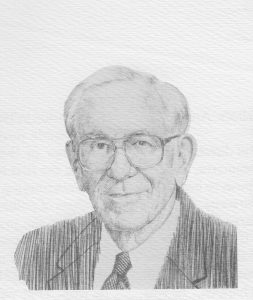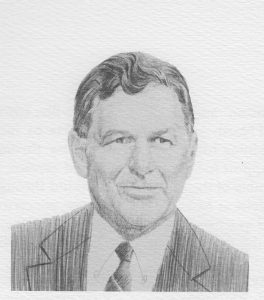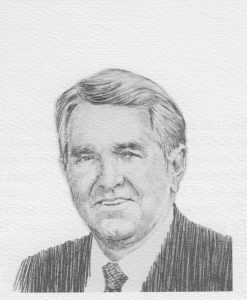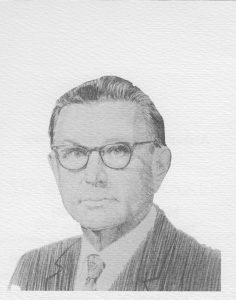In 1947, Mr. Sam Mason was having a hard time making a go of things with his business, Southeastern Tool & Die Company. Aluminum window screens were still new then, and the firm that originally only manufactured tools and dies had added three-screen parts to its production line, right as Mr. Mason’s health was beginning to fail.
“At that time,” recalls Frank L. Mason, “I really had not thought too much about starting with the company … It was more an effort to help my father. He’d helped me all his life.” So, the loyal son laid aside his mechanical engineering studies at The University of Alabama to go into business with his father. It was the first of a lot of smart business decisions the 1982 Alabama Small Business Person of the Year would make in his career.
Frank L. Mason was born May 7, 1924, to Sam Mason and Ruth Jacobs Mason in Birmingham, Alabama. He completed three semesters at The University of Alabama before enlisting in the U.S. Navy, where he completed flight training immediately prior to the end of World War II. Shortly after he went to work with his father, the company was incorporated on April 1, 1948, just five days after Frank Mason had wed Bess Powell Cooper. He received 25 percent of the stock at that time, and the business was incorporated, going on to change its name to the Mason Corporation in 1969.
Today Frank Mason is chairman of the board of his firm, which now manufactures aluminum building products for the home improvement industry, as well as some commercial building products. The Mason Corporation home office is still located in Birmingham, but the concern has grown to include locations in Dallas, Texas; Kansas City, Missouri; Raleigh and Charlotte, North Carolina; Baton Rouge, Louisiana; and Edison, New Jersey. The latest stats on the company show that it has more than 400,000 square feet in total building area, more than 180 employees at eight locations, and offers some 3,000 market items.
Over the years Mr. Mason’s entrepreneurial expertise prompted the U.S. Chamber of Commerce to put him on its board of directors and its Small Business Council. A strong advocate of sharing profits with employees, he served a stint as chairman of the Profit Sharing Council of America, an organization of companies that have profit-sharing plans. He just recently stepped down from that body’s board of directors and served as a director for the Alabama Profit Sharing Council. Profit-sharing, Frank Mason says, is one way of showing the employee he or she is important, and it makes good business sense. “With profit-sharing, you’re really following with deeds what you’re saying with words … it’s a matter of mutual interest and welfare of the company,” he says. And Mr. Mason did indeed back up his words with deeds: his company began profit-sharing as soon as it got on its feet in the early 1950s.
He has been on the National Advisory Council for the Small Business Administration, chairman of the Employee Benefits Committee for the U.S. Chamber of Commerce, and served as the second-ever chairman of the Business Council of Alabama, as well as on its board of directors. He was a member of The University of Alabama College of Commerce and Business Administration Board of Visitors. And the list goes on.
As president of the board of directors of the Alabama Chamber of Commerce, he has been a leader in the state’s push to become a player on the global business scene, stressing teamwork as the necessary element for success in such ventures. “If Alabama is to reach its full international development potential, it will be because we have all worked together to make it happen,” he was known for saying at one point.
In 1980 he was singled out by the Women’s Committee of 100 in Birmingham as the Citizen of the Year and earned his Small Business Person of the Year honors soon after that. At one point he was the member representing small businesses on the Labor and Agriculture Advisory Council for the Federal Reserve Bank of Atlanta. Two times he chaired the Alabama delegation to the White House Conference on Small Business, once in 1980 and then again in 1986. He is currently vice president of the Treasure Forest Landowners Association of Alabama, president of the Alabama Farm Owners Association and serves on the board of Canterbury United Methodist Church in Birmingham.
Over the years as he combined his business interests and natural bent for leadership, Frank Mason found himself drawn to the political arena. He became one of the first two Republicans elected to office in Jefferson County, Alabama when he won the race for justice of the peace in 1956. In 1958 he was the first Republican candidate for the U.S. Congress from Jefferson County. Then, in 1976 he served as an alternate delegate pledged to (now) former U.S. President Ronald Reagan at the Kansas City National Republican Convention; and was a delegate, again pledged to Reagan, at the Detroit Convention in 1980. He served his state in the very visible position of member, and then chairman of the State Ethics Commission during the first half of the 1990s.
Remembering his early years in the business of politics, he says he did not run for justice of the peace because he coveted the position, but because, as a Republican, he believed voters in the heavily Democratic Alabama should have a choice. They agreed; he won. That victory spurred him on to his other efforts.
“I think that small business has some real assets to bring to the political process,” says Mr. Mason. “It’s easy for people passing laws and regulations to overlook the impact of them … A person who has had to mortgage his house to meet a Friday payroll looks at spending differently than if he has never had that experience. So, I think there is validity to the small business perspective in managing government.”
Although retired from day-to-day participation in the management of the business that became his life, Mr. Mason has not retired in the traditional sense. He spends his time now on a farm of some 3,000 acres in North Alabama, where he is involved in efforts to enhance the wildlife populations of the area, and where he works about 80 head of cattle, planning to expand even more in that area. He says he enjoys meeting new people who share these interests he is able to devote more time to now, as he enjoys using talents and skills entirely different than those called for in the metal and building products industry.
Asked how he would like to be remembered, Frank L. Mason does not have to ponder long on his answer.
“I guess being remembered as a person of integrity would be about the best thing you could think of,” he says.





